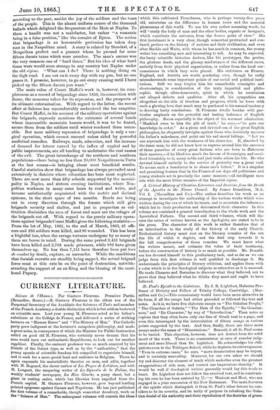CURRENT LITERATURE.
Science de I 'Homm s. Par Gustave Flourens. Premiere Partie. (Bruxelles: Rozez.)—M. Gustave Flourens is the eldest son of the Perpetual Secretary of the Acaddmie des Sciences of Paris and member of the French Academy, a double distinction which is but seldom bestowed on scientific men. Last year young M. Flourens acted as his father's substitute at the Colldge de France, and delivered, a series of striking lectures on "Human Races" and "The History of Man." The Catholic Party grew indignant at the lecturer's outspoken philosophy, and made a great noise, in consequence of which the Minister for Public Instruction called on good old M. Flourens, who certainly never dreamt that his Bons would turn out enthusiastic Republicans, to look out for another sup/Want. Finally, the eminent professor was so mach annoyed by his friends of the Guizot type, as well as by the "authorities," that the young apostle of scientific freedom felt compelled to expatriate himself, and to seek for a more genial land and audience in Belgium. There he again expounds his materialistic theories on man, and edits, together with M. R,ogeard, the clever author of Les Propos de Labi‘nus, and with M. Longaet, the unsparing writer of La Dynastic de la Palisse, the weekly students' newspaper, La Rive Gauche, a puny sheet, but a giant in cutting satire, which has likewise been expelled from the French capital. M. Gustave Flourens, however, goes beyond hurling pointed epigrams against Caesars and Napoleons. He has just published the first volume of a remarkable, though somewhat desultory, work on MOO "Science of Man." The subsequent volumes will contain the ideas which this cultivated Frenchman, who is perhaps twenty-five years old, entertains on the difference in human races and the material phenomena of this world. To use his own rather assuming words, he will "study the body of man and the other bodies, organic or inorganic, which constitute the universe, from the human point of view." His first instalment is a very clear, though somewhat protracted and con- fused, preface on the history of nations and their civilization, and even after Buckle and Waltz, with whom he has much in common, the young writer has something new and interesting to tell. As may be expected, the hasty scientific historian derives, like his prototypes, the genius, the glorious deeds, and the gloomy misfortunes of the different races, entirely from their physical organization, or rather from the local cer- cumstances in which they were placed. His strictures on France, England, and Austria are worth pondering over, though he sadly misunderstands some important points of our social and political insti- tutions. Still we may forgive him his remarkable oversights and shortcomings, in consideration of the truly impartial and philo- sophic, though ultra-democratic, spirit in which he scrutinizes our alleged defects and qualities. After all, his sympathies are altogether on the side of freedom and progress, which he loves with such a glowing love that much may be pardoned to his natural tendency to drawing hasty conclusions. M. Flourens dwells besides with par- ticular emphasis on the powerful and lasting influence of English philosophy. Bacon especially is the object of his warmest admiration. "Mankind owes to him the gift of truth," he says,—"he puts our knowledge in order." As a pious and devoted son of the great English philosopher, he eloquently inveighs against those who derisively uncover his father's nakedness, and point out his sad moral failings. "Let no one reproach him with the weakness of his character. If, absorbed by the inner man, he did not know how to repress around him the excesses of those parasites of every great fortune who are born to dishonour their masters,—if he liked too much the favour of Sovereigns, and sacri- ficed friendship to it, many noble and just traits adorn his life. He who devoted himself entirely to the service of posterity was a great soul. To accuse such a benefactor is to abuse one's father." It is a singular and promising feature that in the France of our days old politicians and young students act in precisely the same manner,—all intelligent moo side with the most bitter enemies of the Imperial regime.






























 Previous page
Previous page